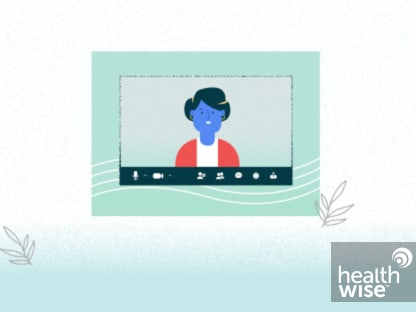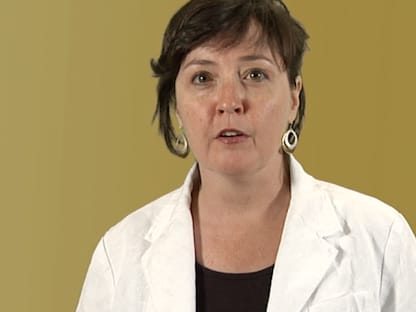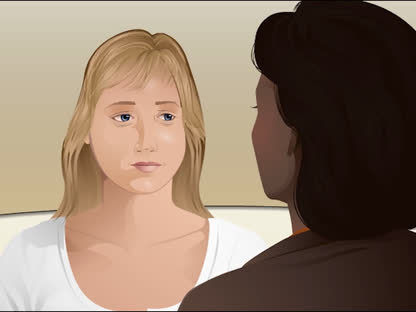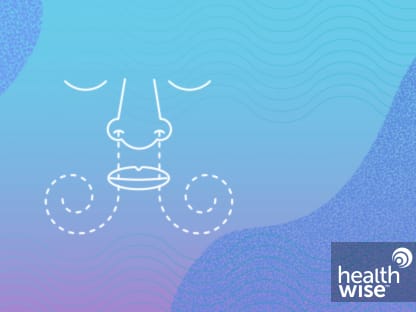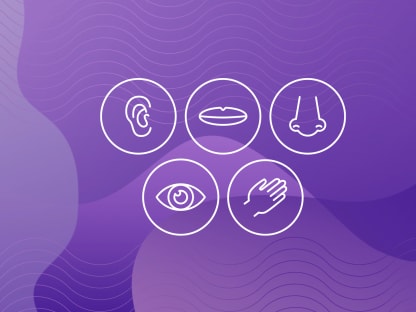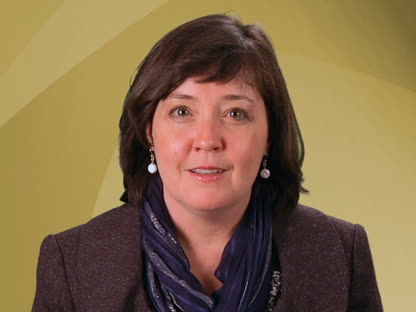Anorexia Nervosa
Condition Basics
What is anorexia?
Anorexia is a type of eating disorder. People who have anorexia usually have a very low body weight because of an intense fear of gaining weight. They may not eat enough food because of this fear. Some people with anorexia make themselves vomit to avoid weight gain. Sometimes they exercise too much. They may have a false belief about how they look (distorted body image). And they may not realize how serious their low body weight is. If not treated, it can lead to serious health problems, starvation, and even death.
Anyone can have anorexia. It usually starts in the teen years. The earlier the problem is treated, the better the chances are that someone with anorexia can recover.
What causes it?
Experts don't really know what causes anorexia. But it may be due to a mix of genetics, family behaviors, social factors, and personality traits. For example, you may be more likely to have anorexia if someone in your family has it or if you do a sport that stresses body size, like gymnastics.
What are the symptoms?
People who have anorexia usually have a very low body weight for their age and height. Because they're very afraid of gaining weight, they may not eat enough food. They may have a false belief about how they look. They may not realize how serious their low body weight is.
How is it diagnosed?
Your doctor will ask questions about your eating habits. This is to see if you have the main symptoms of anorexia. If your doctor thinks you may have anorexia, they'll compare your weight with the expected weight for someone of your height and age. They will also check for signs of malnutrition or starvation.
How is anorexia treated?
You may work with a doctor, a dietitian, and a counselor. Treatment can help you get back to a healthy weight, learn healthier eating habits, and learn to feel better about yourself. If your weight has dropped too low, you'll need treatment in a hospital.
What should you do if you think someone has an eating disorder?
If you think your child has an eating disorder:
- Talk to them. Tell your child why you're worried. Let them know you care.
- Make an appointment for you and your child to meet with a doctor or a counselor.
If you're worried about someone you know:
- Tell someone who can make a difference, like a parent, a teacher, a counselor, or a doctor. A person with an eating disorder may say that they are okay and don't need help. You can help by encouraging them to talk to someone they trust.
Health Tools
Health Tools help you make wise health decisions or take action to improve your health.
What Increases Your Risk
Experts don't know for sure what causes someone to have an eating disorder such as anorexia, bulimia, or binge eating. But certain things put a person at greater risk for getting an eating disorder. Some of these things include:
- Having a family history of an eating disorder.
- Struggling with depression, anxiety, low self-esteem, or obsessive behaviors.
- Feeling a need to be perfect.
- Feeling social or cultural pressure about thinness or weight.
- Having a poor body image.
- Taking part in sports or activities that encourage thinness. Modeling and dance are examples.
- Having a history of physical or sexual abuse.
Having risk factors for it doesn't mean a person will get an eating disorder. But knowing some of the things that can add to the risk may help to see a problem early when it is easier to treat.
Learn more
Prevention
There is no known way to prevent an eating disorder. But knowing the early signs and seeking treatment right away can help prevent problems caused by an eating disorder. Early treatment may be the best way to prevent it from getting worse.
Symptoms
People who have anorexia may not know that they have a serious health condition. So it's important that other people in their life offer support and try to get help for them. If you're worried about someone, you can look for certain signs.
People who have anorexia may:
- Have a very low body weight for their age and height.
- Be very afraid of gaining weight.
- Have a false belief about how they look.
- Deny that their low body weight is a serious health problem.
- Base their self-esteem on how they view their body weight and shape.
Their lives become focused on controlling their weight. They may:
- Obsess about food, weight, and dieting.
- Strictly limit how much they eat.
- Have special ways of eating food or making it look like they've eaten when they haven't.
- Exercise a lot, even when they are sick.
- Vomit or use laxatives or water pills (diuretics) to avoid weight gain.
What Happens
Anorexia may begin with things like a strict diet or skipping meals. Over time, strictly limiting foods leads to malnutrition and weight loss that's harmful.
Malnutrition causes the brain and metabolism to change. This limits the appetite and how your body uses food. It may also affect how you think and make decisions. You might make rules about food or make yourself vomit to avoid weight gain.
Starvation and malnourishment from anorexia can cause other problems. These include osteoporosis or an irregular heartbeat. Often other mental health conditions occur along with anorexia, such as depression.
People who have anorexia may not realize how serious their low body weight is. And recovering from anorexia is very hard without help. So it's important for other people in their lives to try to get help for them. Early treatment gives someone the best chance to recover.
Learn more
When to Call a Doctor
Call 911 or other emergency services immediately if:
- You have severe anorexia, and starvation has become life-threatening.
- You or someone you know is thinking seriously of suicide or has recently tried suicide. Serious signs include these thoughts:
- You have decided on how to kill yourself, such as with a weapon or medicines.
- You have set a time and place to do it.
- You think there is no other way to solve the problem or end the pain.
- You feel you cannot stop from hurting yourself or someone else.
Where to get help 24 hours a day, 7 days a week
If you or someone you know talks about suicide, self-harm, a mental health crisis, a substance use crisis, or any other kind of emotional distress, get help right away. You can:
- Call the Suicide and Crisis Lifeline at 988.
- Call 1-800-273-TALK (1-800-273-8255).
- Text HOME to 741741 to access the Crisis Text Line.
Consider saving these numbers in your phone.
Go to 988lifeline.org for more information or to chat online.
Call your doctor now if you have been diagnosed with anorexia nervosa and:
- Are not able to pass urine.
- Have a pounding heartbeat, skipping heartbeats, or a slower-than-normal heart rate.
- Have been fainting.
- Have severe belly pain; are vomiting up blood; or have black, sticky (tarry) stools. These signs may mean that there is bleeding in the digestive tract.
- Have severe pain anywhere in your body, such as the joints or torso.
Call your doctor if you:
- Have signs of anorexia, including rapid weight loss, eating very little, and being overly concerned about weight and appearance.
- Have lost a lot of weight and can't stop losing weight.
- Fear gaining even a small amount of weight, and this interferes with eating healthy meals.
- Notice that you are secretive or lie about your eating habits.
- See yourself as fat and feel that you must diet, even when other people say you look too thin.
- Have been making yourself vomit or are abusing laxatives or diuretics (bulimia).
- Are not having menstrual periods when you should.
- Feel the need to exercise a lot, and don't give yourself healing or rest time when you are injured or exhausted.
- Have been diagnosed with anorexia and feel dizzy.
Watchful waiting
Watchful waiting is a wait-and-see approach. It's not a safe way to handle a possible eating disorder.
Getting early treatment improves your chances of overcoming anorexia.
Exams and Tests
There is no single test that can diagnose anorexia. But this condition has a visible effect on your health and eating habits.
Your doctor will ask you questions to see if you have the main symptoms of anorexia. If your doctor thinks that you may have anorexia, they will compare your weight with the expected weight for someone of your height and age. Your doctor will also check for signs of malnutrition or starvation.
Common exams and tests include:
- A medical history of your physical and emotional health.
- A physical exam. This may include checking your heart, lungs, blood pressure, weight, mouth, skin, and hair for problems from malnutrition.
- Screening questions about your eating habits.
- A mental health assessment, to check for depression or anxiety.
- Blood tests, to check for signs of malnutrition.
- X-rays. They can show if your bones have been weakened by malnutrition.
Learn more
Treatment Overview
All people who have anorexia need treatment. Treatment can help you get back to and stay at a healthy weight.
You may work with:
- A doctor. They will treat the medical conditions that have been caused by anorexia, such as osteoporosis, heart problems, or depression.
- A registered dietitian. They will help you learn healthy ways to eat and to understand what good nutrition is.
- A counselor or other mental health professional. They can help you learn skills to cope with the emotional issues behind anorexia.
If your weight has dropped too low, you will need to be treated in a hospital.
There are no medicines to treat anorexia. But an antidepressant medicine may help if you also have depression, an anxiety disorder, or obsessive-compulsive disorder.
Anorexia can take a long time to overcome. Many people have ups and downs. Try to think of treatment as an ongoing process.
Learn more
Watch
Self-Care
Here are some things you can do to take care of yourself during recovery from an eating disorder.
- Try to stick to your treatment plan. Go to any counseling sessions you have. If you can't go, or if you don't think the sessions are helping, talk to your counselor about it. And take any medicines you've been prescribed exactly as directed.
- Work on healthy eating habits. Listen to what your counselor and dietitian say about healthy eating. You can work with them to make a plan to eat a variety of healthy foods.
- Learn healthy ways to deal with stress. Managing stress is important in recovery. Find what works for you. You could try things like journaling, volunteering, reading, or meditating.
- Get support from others. This might be from caring family members or friends or an eating disorders support group.
- Take it easy on yourself. Focus on your good qualities. Don't blame yourself for your disorder. And remember that recovery takes time and that you can make progress one goal at a time.
Learn more
Watch
Related Information
Credits
Current as of: October 1, 2025
Author: Ignite Healthwise, LLC Staff
Clinical Review Board
All Ignite Healthwise, LLC education is reviewed by a team that includes physicians, nurses, advanced practitioners, registered dieticians, and other healthcare professionals.
Current as of: October 1, 2025
Author: Ignite Healthwise, LLC Staff
Clinical Review Board
All Ignite Healthwise, LLC education is reviewed by a team that includes physicians, nurses, advanced practitioners, registered dieticians, and other healthcare professionals.
